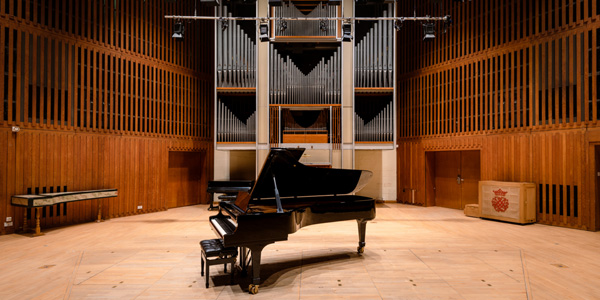Taught Masters degrees in music
Learn key skills from internationally renowned performers and practitioners. At York, you'll have the time and space to develop your own distinctive approach to the discipline.
Why study music at York?
York is a vibrant musical community. You'll be taught by active professionals in modules directly informed by contemporary research and practice. We have excellent working relationships with a range of professional partners and artists-in-association, giving you unique insights into industry and collaborative opportunities. Our academics will challenge you to delve deeper into your musical discipline and consider new approaches to music-making. Whether in performance, composition, analysis, pedagogy, musicology or music technology, practice and scholarship go hand in hand in everything we do.

This unique, intellectually stimulating and fascinating course is perfect for any musician wishing to hone their teaching skills. Understanding effective pedagogy has made my teaching more rewarding and I relish the opportunity to facilitate someone's learning of music. It has helped me secure teaching jobs in two schools, a music centre and build up a plethora of private pupils.
Katie, MA Music Education: Instrumental and Vocal Teaching
Our courses
- Musicology (MA)
- Music: Composition (MA)
- Music Performance: Historical Performance Practices (MA)
- Music Performance: Piano Studies (MA)
- Music Performance: Solo Voice Ensemble Singing (MA)
- Music Performance: Vocal Studies (MA)
- Music Production and Audio Cultures (MA)
- Community Music (MA)
- Music Education: Instrumental and Vocal Teaching (MA)
- Music Education: Group Teaching and Leadership (MA)
- Music, Management and Marketing (MA)
Explore our Masters by research degrees or search all postgraduate taught courses.
Visiting students
Spend up to a year in York as a visiting students from a university outside the UK.

Our facilities
Find out more about our facilities.
.jpg)
Scholarships and funding
Find out more about funding your Masters degree.
Careers
- As part of our dedicated careers support for Music students, we lead practical masterclasses with leading concert artists, as well as workshops with non-Western, folk and jazz musicians. Develop entrepreneurial skills, performance skills, presentation skills and your ability to work as a facilitator in schools and community settings.
- You can perform in a variety of ensembles, each honing your practical skills. Our ensembles include staff-conducted and professional associate ensembles, such as I Fagiolini, Quatuor Diotima and the Yorkshire Baroque Soloists. These groups provide specialist coaching and collaboration opportunities between professional musicians.
Our graduates
Our graduates are working in a wide range of sectors, from performance to community leadership. Recent graduate destinations include major orchestras such as Philharmonia Orchestra and London Symphony Orchestra, teaching in the private, public and Higher Education sectors, radio production (Proms, Radio 3, Radio 4, Classic FM), a range of publishing houses and more.
- Hear stories from York alumni (alumnivoices.co.uk)
- Discover the career choices of alumni from our School - browse graduate profiles
.jpg)